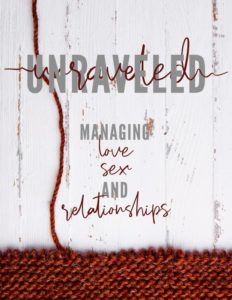If you’re a woman struggling with pornography and looking for resources, you know all too well the lack of content written just for you. If you’re a recovery group leader, you know it too.
For decades, resources for recovering from pornography have been mostly written by men for men. The reason is, for years, the belief was that pornography was something men struggled with, at the exclusion of women.
That belief was obviously wrong. The result is a market saturated with male-oriented content, but an audience that is increasingly female. There is no shortage of resources for men- from Bible studies to video series to entire sets of curriculum to online communities.
The lack of resources written for women, or even acknowledging their struggle, can add to a woman’s shame.
But are they helpful?
That’s what one reader asked who had attended a female recovery group only to find it using content written for men. After she recovered from the initial discouragement, she wondered if it was even worth going back. Could this content, geared toward men, help her as a woman wanting to find freedom?
First of all, I’ve been there.
Second, the answer is yes resources for men can help women, but with a little extra care.
When I first shared my struggle and was working toward freedom, the resource my counselor and I used was clearly written with a male audience in mind. The testimonials were overwhelmingly male and there was a theme throughout that “every man struggles with this.” It was almost a given and practically a joke in this resource as a way of removing the shame for men.
What authors, and small group leaders, and counselors don’t realize though is that blasé attitude about men struggling isolates women. In an effort to include all men, these resources can be written in a way that excludes women. That aspect doesn’t help.
Some ministries tried to fix this. One of the earliest attempts I can recall was a ministry taking their book for men and simply going through and changing the pronouns, adding a chapter on romance, and putting pretty flowers on the cover.
Taking a resource written for men and coloring it pink does not make it a resource for women.
There are layers of a woman’s struggle that simply do not exist to the same extent for men. However, many times these resources can have good content and they can be effective.
My counselor advised me to skip certain testimonials in the book because they were too crass. And when a lesson leaned too heavily into masculine territory, she helped me reframe it as a woman. When all of the extra gender-typing was stripped away, the base content was still solid. It had just been packaged to sell to men.
If you’re a woman being forced to use a resource written for men, treat it more like a buffet than a four course meal. Don’t think you have to apply everything written. Skip over what doesn’t apply, ignore things that may offend, and understand that what you are looking for might not be there. There might be some useful things depending on the resource, but if you’re expecting it to be a complete answer, you’ll be disappointed.
Don’t ignore the truth found in a resource simply because it’s packaged for sale to men.
But if we have access to women’s resources, we need to use those.
Yes, material for men can be helpful but it’s the same way you might use a shoe as a hammer. It works, but why use it when you have an actual hammer?
There are a growing number of resources out there specifically for women. Even for small groups. I’ve helped develop some of them myself.
What’s happening is more women are coming forward with their struggle and asking, “Where is the content for me?” It’s forcing ministries to do more than just “repackage” their resources. It’s resulting in the creation of entirely new resources by women for women.
I’m working on one myself, which will hopefully be available next year. (If you would like to help “pilot” it, let me know!)
So while men’s materials may be helpful, let me recommend one of the resources for women below:
(Many of these are affiliate links)
Restored: A Woman’s Guide to Overcoming Pornography was written by my friend and colleague, Alice Taylor of “The Grace Spot Ministries.” She enlisted the help of our mutual friend, Lacy Bentley, author of Addicted to Love and co-founder of Women United Recovery Coalition (WURC). The great thing about Alice’s book is you can get the electronic version for free. Just head over here. Contact Alice if you need hardcopies of the book.

Unraveled is a resource for women written by the team at Pure Desire Ministries (creators of the Conquer series and Seven Pillars of Freedom). I haven’t read it but it appears to be a study that can be done on its own or in a group. It even has a kit option that comes with an additional workbook. If your church already has a Conquer series for men, I’d encourage you to look into the Unraveled resource for women. The Conquer series is a little too “macho.” You can pick up Unraveled from Pure Desire’s website. (It’s on sale right now)
The Proven Women study is available on Amazon but might be cheaper from the original storefront at Provenwomen.org. I’ve actually been in contact with the team about the need to rebrand the Proven Women site so it doesn’t say “Proven Men” all over it. They’re on it: these things take time. However, this content was written by a woman and is designed for women. The book itself is rather huge and on the more expensive side, but might be worth looking into for a church or counselor to have as a resource.
Sexual Sanity for Women has long been the resource I recommend when a church or college wants to set up a small group. It was put together by Ellen Dykas at Harvest USA and is available through Amazon or through Harvest’s store (where it is currently on sale). It is a small group guide that tackles female sex addiction from a “big picture” approach, helping women connect their current struggles with root issues. I wrote a review on it when I read it.
The lack of resources is frustrating for women and ministries alike.
Don’t fault a church or group for using what they have and what has worked for years for their men. Instead, be the voice that inspires change. Share the fact that the struggle women face is different than that of men and that women benefit most from resources tailored for them. Thankfully, those now exist and more are being created.








